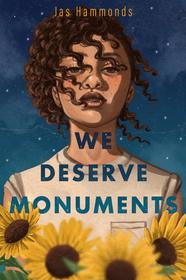
|
|
| Jas Hammonds (photo: Kay Ulanday) |
|
On Monday, January 30, at ALA's LibLearnX conference, Jas Hammonds won the Coretta Scott King John Steptoe Award for New Talent for their debut, We Deserve Monuments (Roaring Brook Press).
Congratulations! We Deserve Monuments was one of the buzziest books of 2022--everyone was talking about it! How has it felt to get so much love on your debut?
It's been incredible and a bit surreal. Never in my wildest dreams did I imagine my debut novel receiving so much love from librarians and booksellers and educators, but I'm extremely grateful!
A little birdie told me you got the call on your birthday! Is that true? What was that like?
My birthday was actually on a Friday, and I got the call on Sunday--but I'm in the camp that makes their birthday a weeklong affair so I was still very much in celebration mode. I was lounging in my pajamas reading a book when I got the call, and I was shocked. I don't even remember what I said when they told me the news. I was filled with gratitude and so much joy. I still feel like it's all a dream.
Would you give our readers your two-sentence pitch for We Deserve Monuments?
Seventeen-year-old Avery Anderson's life is uprooted when her mother moves the family down to rural Georgia to care for the dying family matriarch. As Avery gets to know her estranged grandmother, she uncovers a trove of family secrets and falls in love with the girl next door.
 What was your inspiration for this book? How long did you live with it before you decided to write it down?
What was your inspiration for this book? How long did you live with it before you decided to write it down?
I initially wanted to write a ghost story. I had this image of three friends in the woods, telling a chilling story of an angry ghost who haunted their small town. I toyed with that version of the story for a few months, but eventually that ghost became my main character's grandmother, Mama Letty. Over the course of the story, Avery learns the truth behind Mama Letty's anger and grief. There is only one scene in the book that has stayed the same from the very first draft (and I always love to hear people guess which one they think it is!).
You're a flight attendant who does a lot of writing and reading while traveling. How are you able to get so much done while on the road?
I write a lot in hotel rooms on layovers or on airplane tray tables during my cross-country commute. I love being a flight attendant because it gives me so much flexibility with my schedule. If I need to write a scene set at a bar in Austin, Tex., I can pick up a layover and see it for myself. I'm constantly interacting with new people and overhearing so many conversations--a writer's dream! I get a ton of reading done when I'm working red-eye flights and all the passengers are asleep and there's nothing to do. Finally, I love seeing book trends in real time and seeing what a majority of people are reading as I pass by with the beverage cart.
We Deserve Monuments, like Sabaa Tahir's All My Rage, deals with intergenerational relationships and trauma that gets passed through families. What was it like to write such an emotional work?
Writing about generational trauma was very difficult. In my family in particular, there are a lot of stories that are lost to time because people have passed away, there are no records, minimal photos, etc. I had many long conversations with my mother while writing this book, and it was a new kind of coming-of-age for me to get to know her in this way. She's the only member of the Black side of my family I've ever really gotten to know--everyone else died before I was six. There's a lot of unpacked grief that's still hard to talk about. Needless to say, I am very much looking forward to shifting gears in future projects and writing something cozy and feel-good and not quite as sad... though who am I kidding, it will probably sneak its way in there anyway! (P.S. All My Rage was one of my favorite reads of 2022, and I'm so thrilled for all the love Sabaa is receiving for it.)
Did you have to do any research for the book?
So much! I spent a lot of time researching musical artists of the '50s, '60s, and '70s (including a super cool trip to Stax Museum of American Soul Music in Memphis!). Music is one of my biggest inspirations, and I often need to hear scenes before I can write them. I also did a lot of research about the Jim Crow era, segregation academies, underground gay and lesbian bars, juke joints and the civil rights movement. A lot of the research didn't even make it into the final version of the book, but all of it is important for me to know as a writer and as someone descended from a line of Black women with roots in north Florida and rural Georgia.
Have you revisited the book since it published? Is there anything in it that you are particularly happy/proud to have included? Is there anything you wish you could add?
I listened to the audiobook post-publication, and that was a beautiful experience (Tamika Katon-Donegal is a star, check it out)! Mostly, I'm just happy that it exists. I'm happy that my debut is one that celebrates queer Black joy. The only thing I wish I could change is a typo that I found in the hardcover because it killed a piece of my little perfectionist heart hahaha.
Are you working on anything new?
Yes! I am currently in edits for my second YA novel, due out summer 2024. I say We Deserve Monuments is a book I wrote when I was angry at the world, but this second book is one I wrote when I was angry with myself. It's very personal, and I'm anxious/excited to see it taking shape.
Is there anything else you'd like to tell Shelf Awareness readers?
Thank you. If you've read my book, bought it, borrowed it, reviewed it, told a friend about it, selected it for a book club--thank you for witnessing my heart in the form of a novel. It means more than you could ever know. --Siân Gaetano, children's and YA editor, Shelf Awareness

